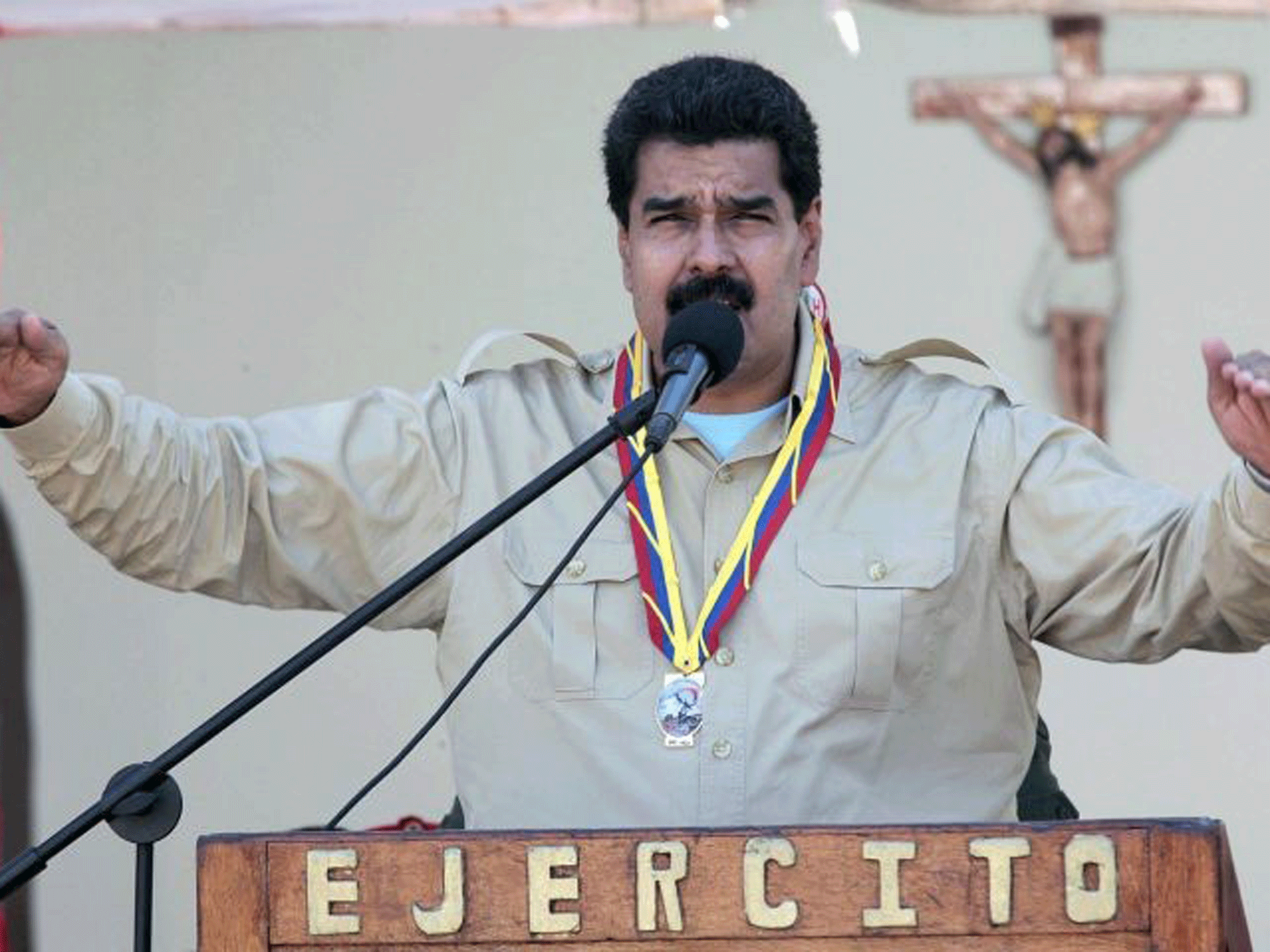Venezuelan President Nicolas Maduro expels top US diplomat
US Embassy denies accusations that its staff 'conspired' with South American country's 'extreme right'

Your support helps us to tell the story
From reproductive rights to climate change to Big Tech, The Independent is on the ground when the story is developing. Whether it's investigating the financials of Elon Musk's pro-Trump PAC or producing our latest documentary, 'The A Word', which shines a light on the American women fighting for reproductive rights, we know how important it is to parse out the facts from the messaging.
At such a critical moment in US history, we need reporters on the ground. Your donation allows us to keep sending journalists to speak to both sides of the story.
The Independent is trusted by Americans across the entire political spectrum. And unlike many other quality news outlets, we choose not to lock Americans out of our reporting and analysis with paywalls. We believe quality journalism should be available to everyone, paid for by those who can afford it.
Your support makes all the difference.Venezuelan President Nicolas Maduro today announced the expulsion of the most senior US diplomat in the country for allegedly conspiring with “the extreme right” to sabotage the economy and power grid.
Two other US embassy employees have also been expelled. The embassy said it had not yet received notification from the Venezuelan foreign ministry, but called the accusations unfounded.
Mr Maduro, making the announcement during a live TV appearance, said that the trio had 48 hours to leave the country.
The leftist leader said a group of embassy officials that his government had been following for months was “dedicated to meeting with the Venezuelan extreme right, to financing it and feeding its actions to sabotage the electrical system and the Venezuela economy.”
“I have proof here in my hands,” he said, though he did not offer any details on the diplomats' alleged transgressions other than to say they met with opposition and trade union leaders in the south western state of Bolivar, which is home to a number of troubled state-owned foundries and Venezuela's main hydroelectric plant.
During Mr Maduro's TV announcement he shouted in English, “Yankees go home!”
Those expelled by the authorities were Charge D'Affaires Kelly Keiderling, the top embassy official in the absence of an ambassador, consular officer David Moo and Elizabeth Hoffman, who works in the embassy's political section.
“We completely reject the Venezuelan government's allegations of U.S. government involvement in any type of conspiracy to destabilize the Venezuelan government,” the U.S. Embassy said in a statement.
It said the recent trip by Keiderling, Moo and Hoffman consisted of “normal diplomatic engagement,” before adding, “We maintain regular contacts across the Venezuelan political spectrum, including the ruling party.”
The expulsions are the latest example of Mr Maduro's hostility to Washington since he took over from the country’s long-serving president, Hugo Chávez, who died in March.
Venezuela and the United States have been without ambassadors since 2010, when Chavez refused to accept a newly-named US ambassador. In 2008, Chavez expelled then US Ambassador Patrick Duddy in “solidarity” with Bolivia, which was throwing out the US ambassador there, but allowed him to return the following year.
There had been hopes that relations between Caracas and Washington would thaw following the election of Mr Maduro, a former foreign minister, to office. Late last year the two nations held informal talks in order to improve diplomatic relation. But Venezuelan rhetoric towards the US has remained as hostile as they were under Mr Chavez.
The latest expulsions come as Venezuela's economy looks increasingly troubled ahead of local elections on 8 December. Annual inflation is at more than 45 percent and the government is running short of foreign currency.
Ms Keiderling arrived at the embassy in July 2011 as deputy chief of mission after previously working in embassies including in Moldova, Kyrgyzstan, Botswana, the Dominican Republic and the U.S. Interests section in Cuba.
The oil-rich OPEC member country has been plagued by worsening power outages since 2010. The Venezuelan opposition blames neglect and poor maintenance, while alleging mismanagement and corruption at struggling state-owned aluminum, iron and bauxite foundries in Bolivar.
A massive power outage on 4 September left around 70 percent of the country without electricity, hitting parts of the capital.
Mr Maduro blames sabotage by the “extreme right” for the blackouts and food shortages, but has provided no evidence. Like Chavez, he has a history of making unsubstantiated accusations against the United States and his political opponents.
Last week, Mr Maduro announced that he had cancelled a planned trip to New York to address the UN General Assembly, due to an unspecified US plot.
Join our commenting forum
Join thought-provoking conversations, follow other Independent readers and see their replies
Comments